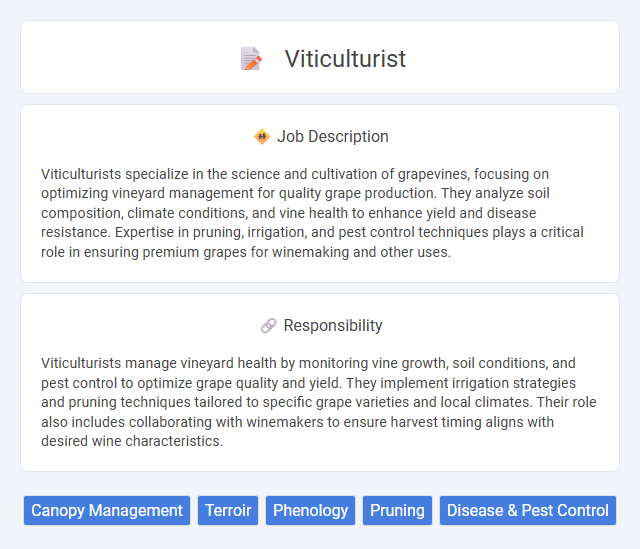
Viticulturists specialize in the science and cultivation of grapevines, focusing on optimizing vineyard management for quality grape production. They analyze soil composition, climate conditions, and vine health to enhance yield and disease resistance. Expertise in pruning, irrigation, and pest control techniques plays a critical role in ensuring premium grapes for winemaking and other uses.
People who enjoy working outdoors and have a strong interest in plant science may be suitable for a viticulturist job. Those with physical stamina, attention to detail, and a preference for seasonal work cycles might find it fitting. However, individuals who prefer stable indoor environments or routine office tasks may find this role less suitable.
Qualification
A viticulturist typically requires a bachelor's degree in viticulture, horticulture, agriculture, or plant science, with advanced roles often demanding a master's degree or specialized certifications. Proven expertise in vineyard management, grapevine biology, pest control, and soil science is essential for optimizing grape production. Hands-on experience with irrigation techniques, disease prevention, and data analysis tools significantly enhances job performance and career advancement.
Responsibility
Viticulturists manage vineyard health by monitoring vine growth, soil conditions, and pest control to optimize grape quality and yield. They implement irrigation strategies and pruning techniques tailored to specific grape varieties and local climates. Their role also includes collaborating with winemakers to ensure harvest timing aligns with desired wine characteristics.
Benefit
A career as a viticulturist likely offers significant benefits such as the opportunity to work closely with nature and contribute to sustainable agriculture. There is a probable increase in demand for experts skilled in grape cultivation due to the growing wine industry, which may enhance job stability and income potential. Exposure to innovative agricultural technologies and practices might also provide continuous professional growth and skill development.
Challenge
The role of a viticulturist likely involves managing the complexities of vineyard ecosystems, including unpredictable weather patterns and pest outbreaks that can threaten grape quality and yield. Grapevine diseases may require constant monitoring, demanding prompt and precise interventions to maintain healthy vines. Balancing sustainable practices with economic viability could present ongoing challenges in this specialized agricultural field.
Career Advancement
Viticulturists specializing in grape cultivation can advance their careers by gaining expertise in vineyard management, pest control, and soil health optimization, leading to supervisory or consulting roles. Pursuing advanced degrees in plant science or enology enhances opportunities for research positions and leadership in wine production companies. Networking within agricultural associations and staying updated on technological innovations in viticulture further supports career growth and higher earning potential.
Key Terms
Canopy Management
Canopy management in viticulture plays a critical role in optimizing grapevine health and fruit quality by controlling sunlight exposure, air circulation, and fruit zoning within the vineyard. Effective canopy techniques such as shoot positioning, leaf thinning, and pruning reduce disease risk and improve photosynthesis, directly impacting grape sugar concentration and flavor development. Skilled viticulturists analyze vine growth patterns and microclimate conditions to implement canopy strategies that enhance vineyard productivity and sustainability.
Terroir
A viticulturist specializes in the science and cultivation of grapevines, with a keen focus on terroir--the unique combination of soil, climate, and topography influencing grape quality and flavor profiles. Understanding terroir allows viticulturists to optimize vineyard management practices, such as irrigation, pruning, and pest control, to enhance grapevine health and maximize yield. Expertise in analyzing terroir conditions directly impacts wine characteristics, making the viticulturist's role critical in producing distinctive and high-quality wines.
Phenology
Viticulturists specializing in phenology analyze grapevine growth stages to optimize harvest timing and improve fruit quality. They monitor bud burst, flowering, veraison, and ripening to predict vine development patterns under varying climatic conditions. This expertise supports precision vineyard management, enhancing yield consistency and wine character.
Pruning
Viticulturists specialize in managing grapevine growth through precise pruning techniques that improve fruit quality and maximize yield. Effective pruning controls vine vigor, optimizes sunlight exposure, and reduces disease risk by removing dead or overcrowded wood. Mastery of seasonal pruning methods directly influences grapevine health and the overall success of vineyard production.
Disease & Pest Control
Viticulturists specialize in managing grapevine health by implementing integrated disease and pest control strategies tailored to specific vineyard ecosystems. They conduct regular monitoring to identify early signs of fungal infections such as powdery mildew, downy mildew, and botrytis bunch rot, applying targeted fungicides and biological controls to minimize crop loss. Utilizing precision agriculture technologies, viticulturists optimize pesticide applications to reduce chemical use while safeguarding grape quality and vineyard sustainability.
 kuljobs.com
kuljobs.com